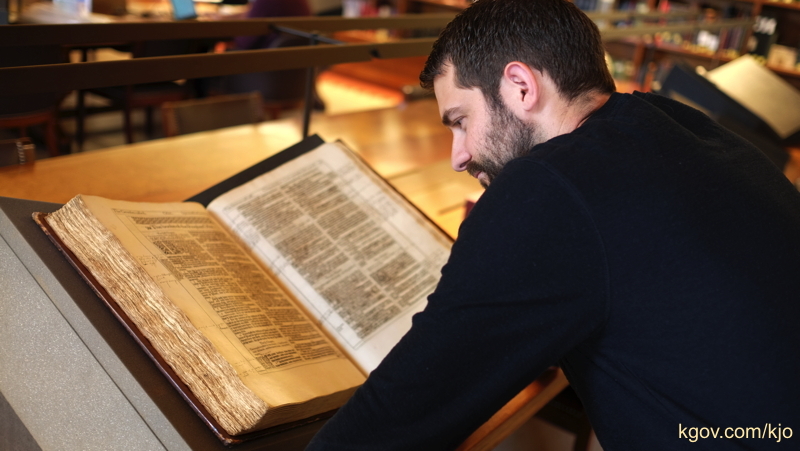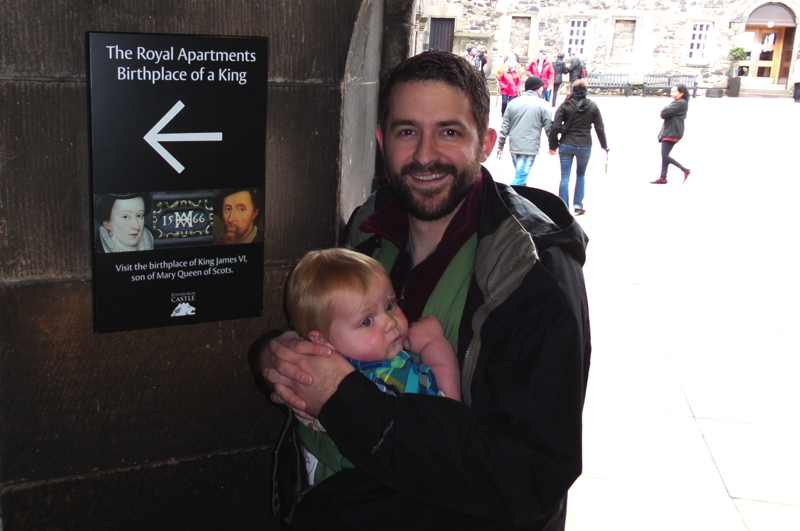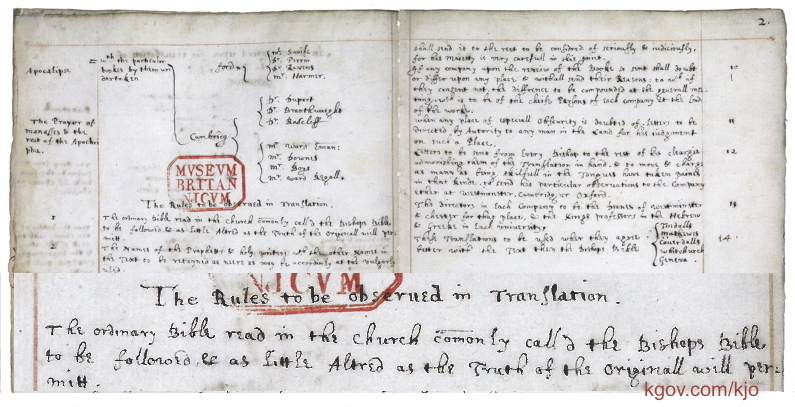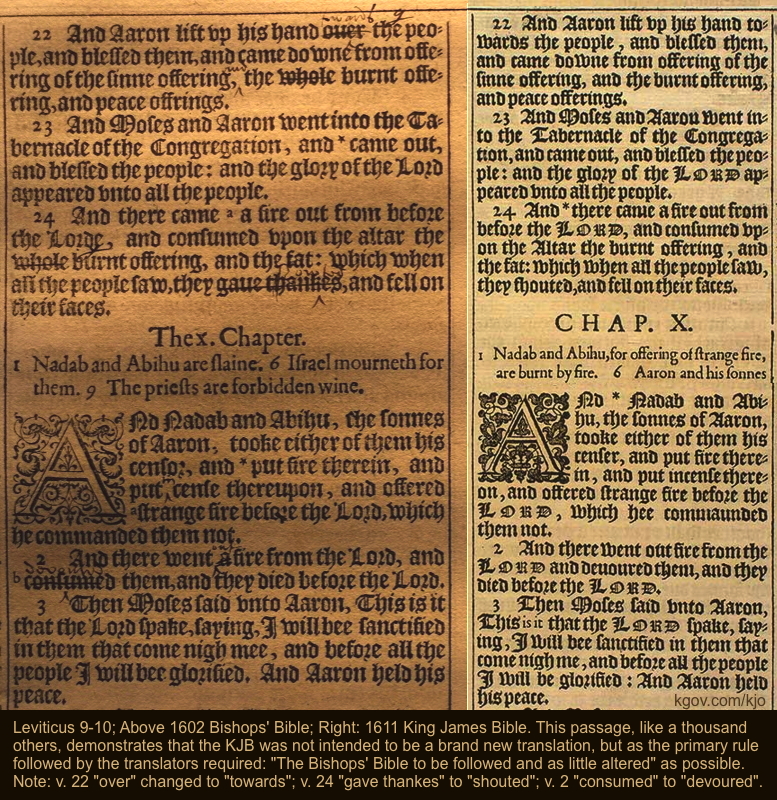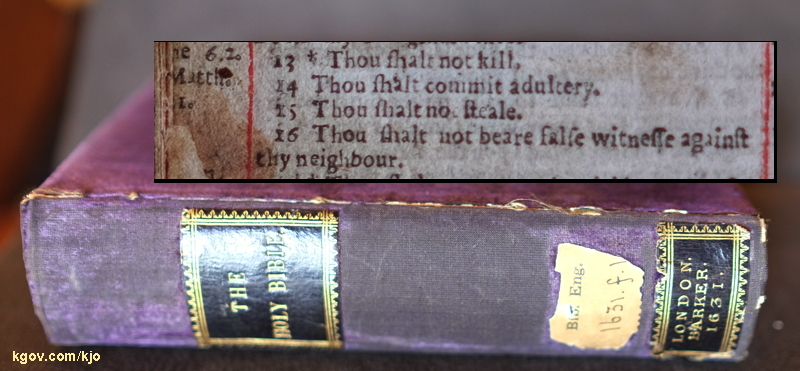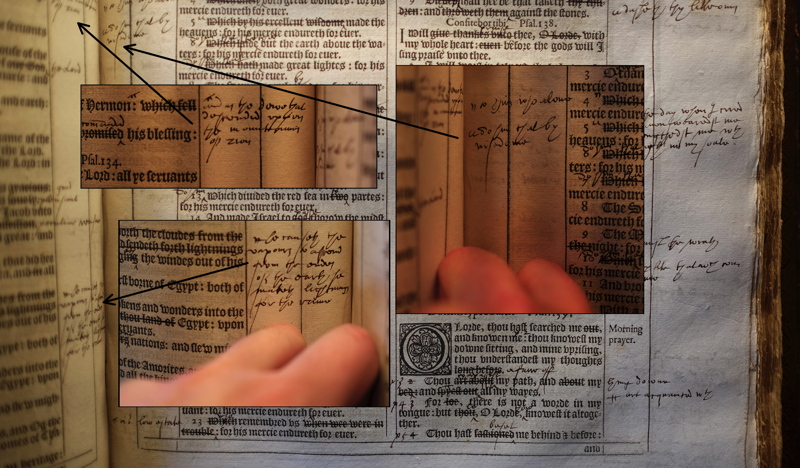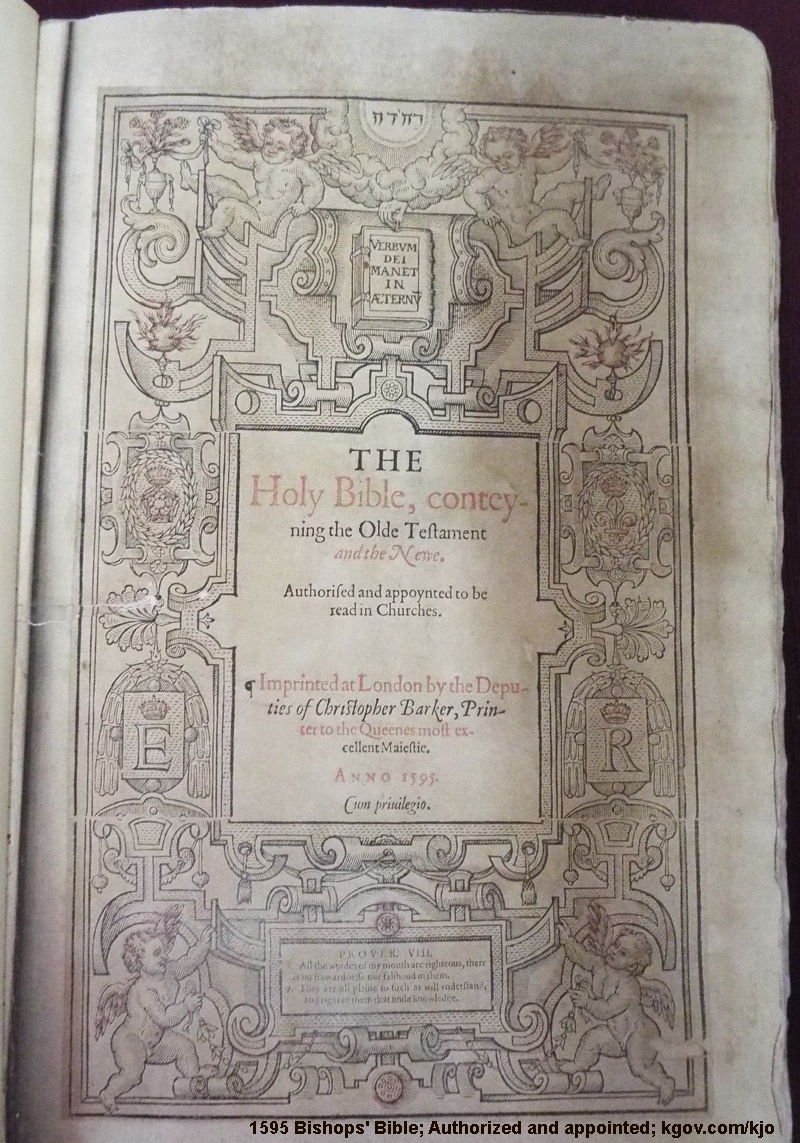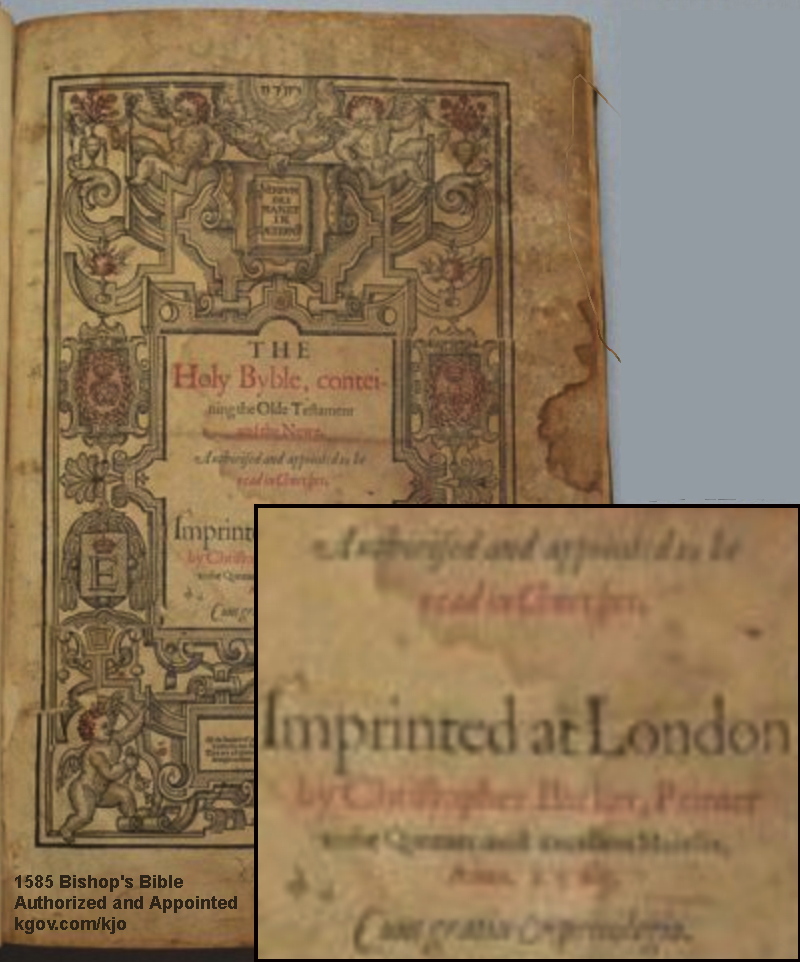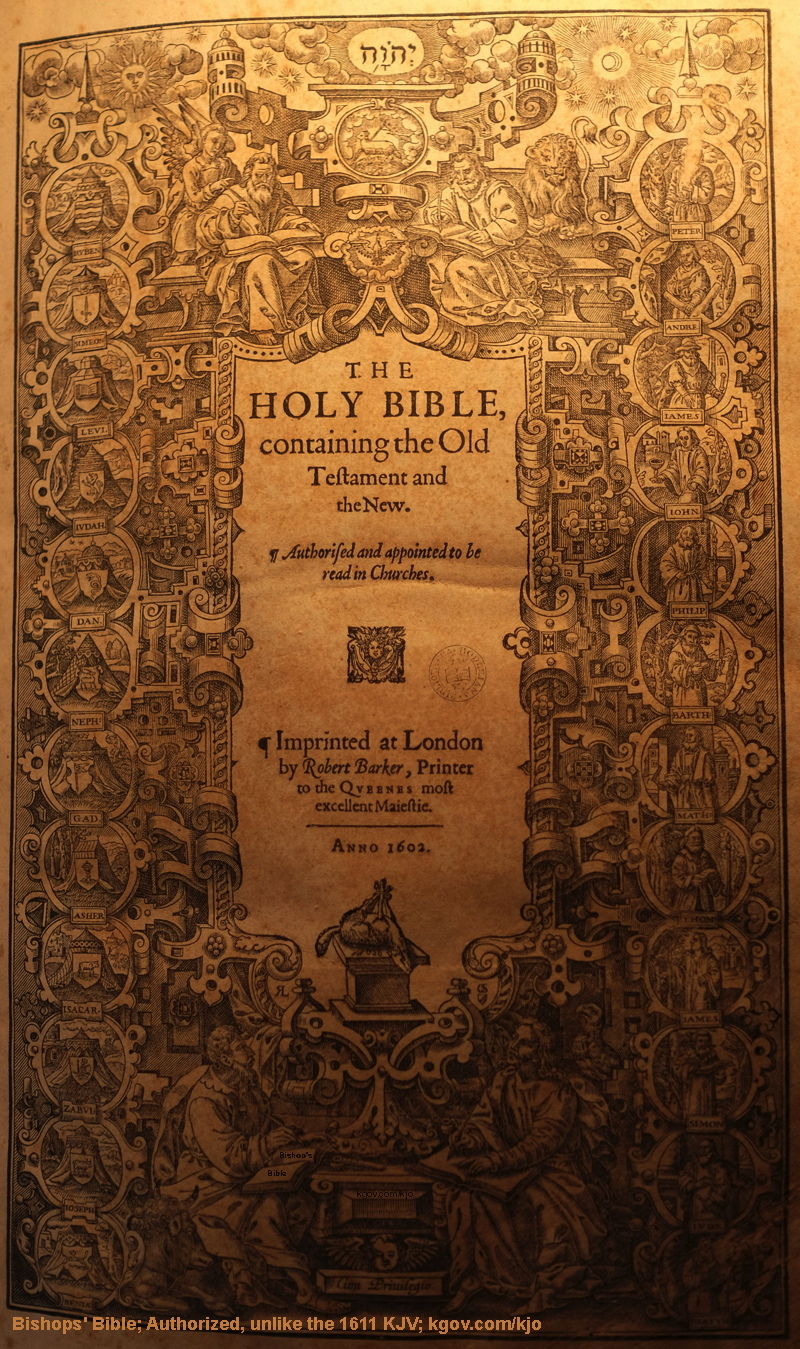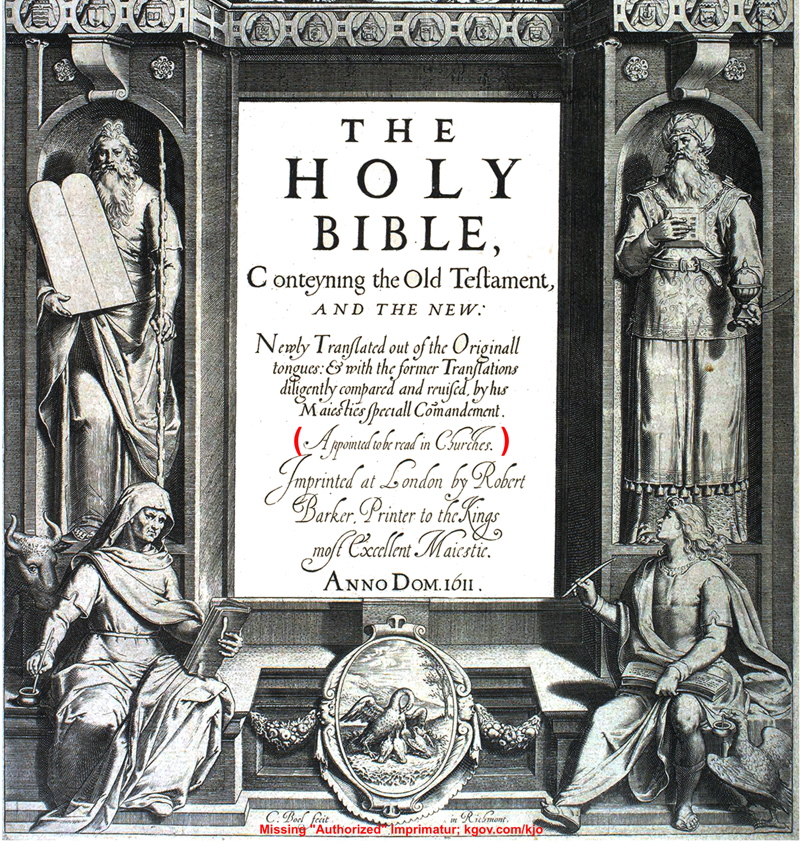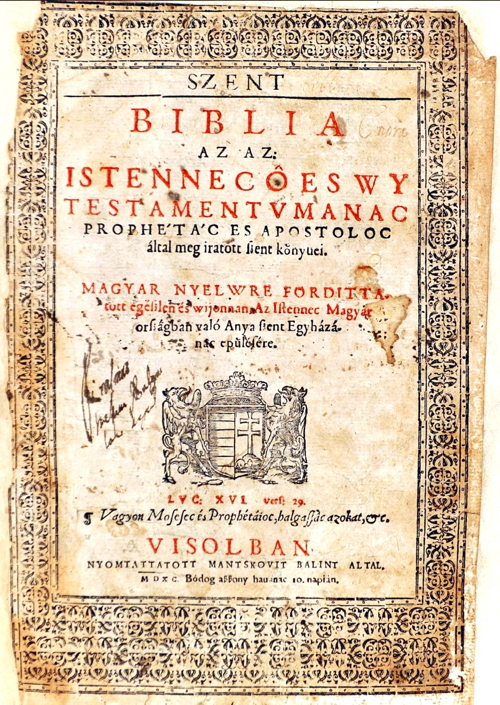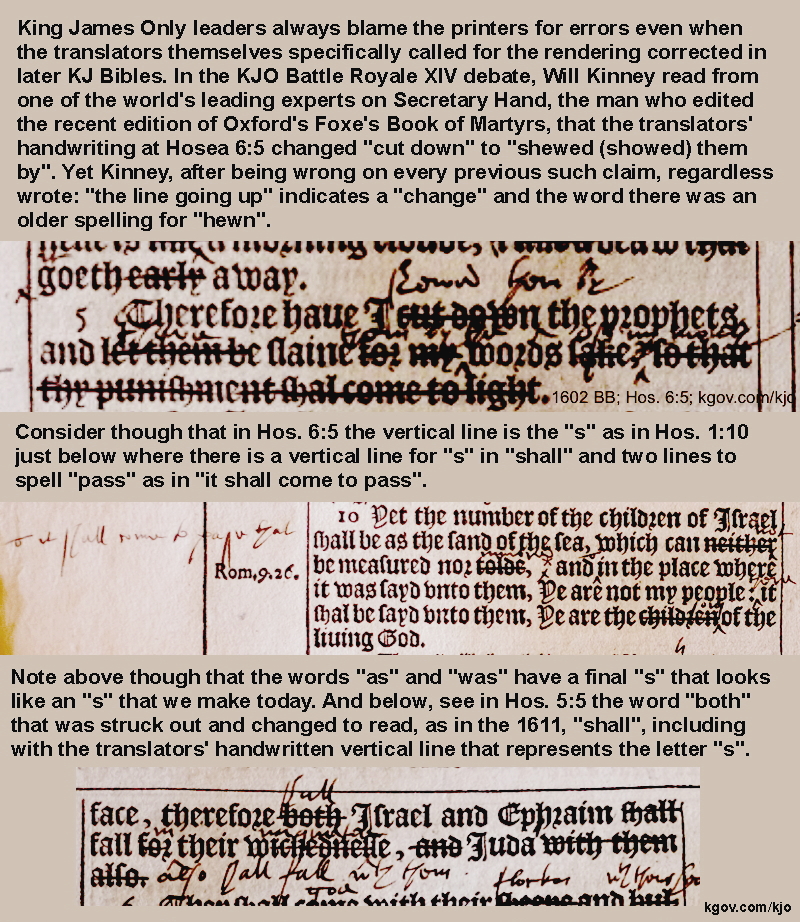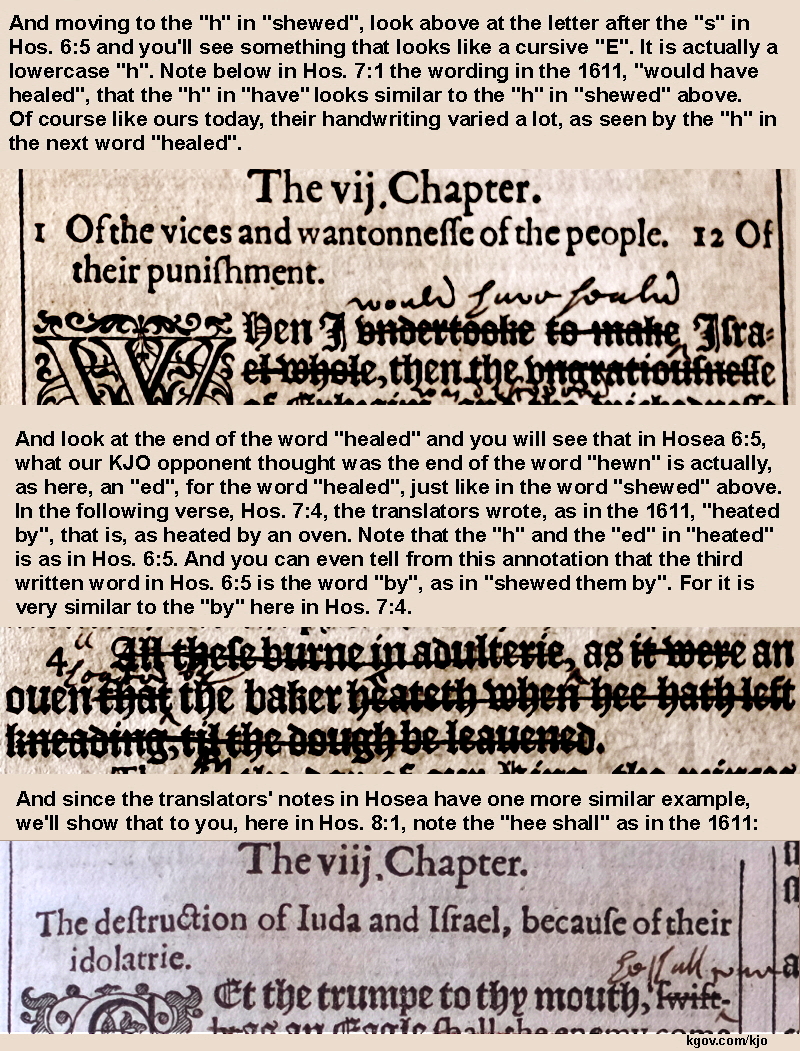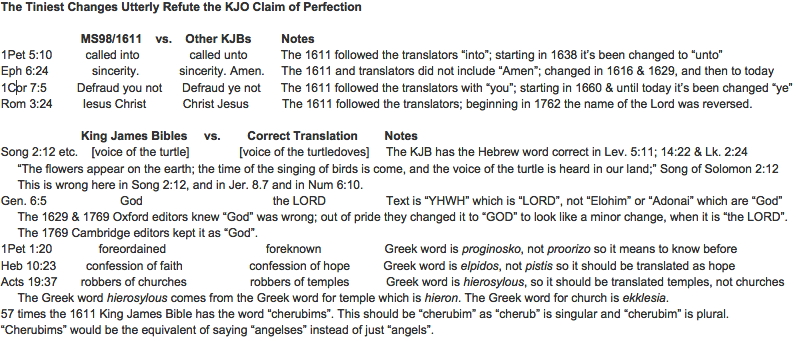Round 4 Is the KJB the only inerrant Bible?
Round 4 Is the KJB the only inerrant Bible?
Hello once again. Thanks again for allowing us to have this debate/discussion about the inerrancy of the King James Bible.
Some of you may have noticed that I did not address all the questions Bob E. and Will D. asked (again) in their last post.
Bob E. mentions this saying: “BWQ4b BWQ9 BWQ10 BWQ11 BWQ18
You must respond to the questions asked of you just as Bob and Will must respond to your questions. Take more of your allowed 48 hours between posts and make every round count.
Will Kinney, please answer those five questions in your next post.”
The reason I did not answer them AGAIN is because they were the same questions about the same things they brought up in their previous posts. I already answered them and I see no need to merely repeat the same answers I gave before.
Bob E. and Will D. have presented no convincing evidence to prove their examples are anything other than mere printing errors and they now bring up another example of where they claim the KJB “corrected or improved a reading.”
I would agree that they corrected a “typo” or “a mere printing error”, but they did not correct what they had previously sent to the printers.
The example they bring up this time is found in Hosea 6:5 where the first printing of the KJB had “Therefore have I SHEWED them by the prophets: I have slain them by the words of my mouth…”
This is easily proven to be nothing more than an easily explained printing error, but our Bible critics seem to think they have found the mother lode example of a proven change in the intended text or an “afterthought” of a better way to translate the passage. It is nothing of the kind.
The KJB correctly reads “Therefore have I HEWED them by the prophets; I have slain them by the words of my mouth…”
You will notice that this “typo” (printing error) consists of the mere addition of one letter - S - at the beginning of the word. This typo was caught and corrected in 1612, the very next year.
How do we know it was a simple printing error? All we have to do is check both the underlying Hebrew text and the previous English Bibles. The Hebrew text uses the word # 2672 ghah-tzehv, and this same word is translated as “to hew” or “to cut” or “to divide” in Isaiah 51:1 “Look unto the rock whence ye ARE HEWN, and to the pit whence ye are digged.”
And again in Isaiah 22:16 “…and whom hast thou here, that thou hast HEWED thee out a sepulcher here, as he that HEWETH him out a sepulcher on high, and that gravest an habitation for himself in a rock?”
In Hosea 6:5 the previous English bibles read “I HAVE CUT DOWN”. These were Coverdale 1535, the Great Bible, Matthew’s bible, the Bishops’ bible and the Geneva Bible 1587.
And Wycliffe’s bible 1395 as well as the Douay-Rheims bible of 1610 both had “I HEWED”
The Geneva Bible reads “Therefore have I CUT DOWN by the prophets; I have slain them by the words of my mouth…”
Now also reading “I HEWED THEM by the prophets” are the Revised Version 1885, ASV 1901, RSV, NKJV, NASB, ESV and Modern English Version 2014, to name but a few. This is obviously nothing more than a simple printing error that was immediately caught and corrected.
Our Bible critics have a picture with notes that even they say are hard to read.
Handwritten Confession: This same nicer-than-God tendency also produced the 1611 error of softening Hosea 6:5 from “cut down” to “show”. The translators revised Hosea 6:5 from the 1602 Bishops’ Bible to moderate the message by producing a rendering never before seen in any text, to say that God “shewed [showed] them by” the prophets that they were slain by His words.

As I look at this writing, it obviously does NOT says “I shewed”. What I see here is a line going up to indicate a possible change, followed by the letters “EOWN you by” Since English spelling was far from standardized in 1611, it looks to me like he is suggesting “hewn you by” They often spelled words without the initial “h”, that today do have an “h”.
But, in any event, we know from looking at the Hebrew and the previous English Bibles that the KJB translators would not have put the word “shewed” instead of “hewed”. This was a simple printer’s typo.
Exodus 20:13 “Thou shalt not KILL.”
Next Bob E. and Will D. bring up the example of “Thou shalt not KILL” as found in Exodus 20:13 and somehow claim that this is “a subtle form of self-righteousness” and “a mistranslation”.
I have an entire article on my website about Exodus 20:13 and in it I show that it most definitely is NOT a translation error and that the modern versions like the NKJV, NIV, ESV, NASB, etc. themselves are inconsistent on how they translate this word. They ALL often translate it as KILL.
Not only does the KJB translate Exodus 20:13 as “Thou shalt not KILL.” but so too do the following Bible translations - Tyndale 1534 (he translated Exodus before his death), Coverdale 1535, The Great Bible 1540 - "Thou shalt not kyll.", Matthew's Bible 1549, Bishops' Bible 1568, the Geneva Bible 1599, Webster's translation 1833, the Longman Version 1841, the Brenton Bible 1851, Lesser Bible 1853, the Smith Bible 1876, The Revised English Bible 1877, the Sharpe Bible 1883, the 1936 Hebrew Publishing Company version, the Douay-Rheims of 1610, Darby 1890, the American Standard Version 1901, The Improved Bible 1913,*the Catholic Douay 1950,*the Revised Standard Version 1952, Lamsa's 1933 translation of the Syriac Peshitta - "You shall not KILL.", the St. Joseph New American Bible 1970, the New Life Version 1969, the Updated Bible Version 2003 - "You shall not KILL.", The Word of Yah 1993,*the KJV 21st Century Version 1994, Green's Modern KJV 1998, the Third Millennium Bible 1998, God's First Truth 1999 "you shall not KILL", The Complete Apostle's Bible by Paul Espositio 2005 - "You shall not KILL.", The Revised Geneva Bible 2005, the Context Group Version 2007, the Heritage Bible 2003, Bond Slave Version 2012, Hebraic Transliteration Scripture 2010, The Work of God's Children Illustrated Bible 2011, the brand new critical text Common English Bible of 2011 - "Do not KILL.", The New Brenton Translation 2012 - "You shall not KILL.", The Revised Douay-Rheims Bible 2012, *and the Katapi New Standard Bible 2012 - "You shall not KILL."
And this online Interlinear Hebrew Old Testament - “Thou shalt not KILL.”
http://studybible.info/IHOT/Exodus 20:13
The most common form of the so called Greek Septuagint in print says in Greek ou Phoneuseis and then translates it as "Thou shalt not KILL."
*
Foreign Language Bibles
Among foreign language Bibles that also say "Thou shalt not KILL" are the Spanish Cipriano de Valera 1602, the *Reina Valera 1909, 1960, 1995, La Biblia de las Américas 1997 - "no*matarás", (the Spanish word for murder is "no asesinarás" or perhaps "no cometerás homicidio", but "no*matarás is clearly "thou shalt not kill"), *the French Martin 1744, Louis Segond 1910 and the French Ostervald 1996 - "Tu ne tueras point.", the Italian Diodati 1649, the New Diodati 1991 and the 2006 Nuova Riveduta - "Non uccidere.", Luther's German Bible 1545 - "Du sollst nicht töten.", the Russian Synodal Version - "Не убивай." = "Thou shalt not KILL.", the Tagalog Ang Dating Biblia 1905 -*"Huwag kang papaya." = "Thou shalt not KILL.", Swedish Bible 1917 - "Du skall icke dräpa.", Vietnamese Bible 1934 - "Ngươi chớ giết người.", Chinese Union Traditional Bible - "不 可 殺 人 " , The Czech BKR Bible -"Nezabiješ.", the Dutch Staten Vertaling - "Gij zult niet doodslaan." and the Portuguese Almeida Actualizada (Modern Almeida), A Biblia Sagrada em Portugués and the 2000 O Livro -* "Não matarás."
It is more than a little hypocritical for the NIV English version to make a big deal out of the alleged difference between "to kill" and "to murder", but at the same time to make foreign language translations of the NIV that simply say "Do not KILL."
The NIV Spanish version simply says: "No mates.", which clearly means "Do not KILL." and NOT "Do not murder."- La Santa Biblia, Nueva Versión Internacional® NVI® Copyright © 1999.
Likewise the NIV Portuguese version simply say "Do not KILL." - “Não matarás." -*Nova Versão Internacional*NVI® Copyright © 1999
Both the 1828 and 1975 Webster Dictionaries tell us that the word "kill" means, "to deprive of life." The word "murder" means, "the crime of unlawfully killing a person." Both can be used interchangeably, in that it is impossible to murder a person without killing them. However, there are those who still object to the phrase, "thou shalt not kill" insisting that it must be "you shall not murder." Therefore, so they state, modern versions have clarified the difference for us. But have they really?
The English word "kill" means to deprive of life. The word "murder" means to unlawfully kill a person." Therefore, by English definitions, the word murder involves an unlawful act. However, if it is lawful it would not be murder to deprive someone of life. With this in mind, I certainly think the phrase "thou shalt not kill" is much better. For this simple reason, abortion is the law of the land. It is not illegal for a doctor to deprive a living child of its life if the mother consents to this act. You can therefore justify abortion on the grounds that it is not murder because it is not unlawful.”
If, as the KJB critics affirm, there is a distinct difference between "to kill" and "to murder", they are contradicted by the very versions they promote. Other words are also translated as both "to kill" and "to murder", and often when describing the clear act of what we would call "murder", the NKJV, NIV, NASB use the word "to kill".
The Hebrew word 'harag' # 2026, is translated by all these versions as both to kill and to murder, showing them to be synonymous terms. Notice these few examples of the many that could be given.
Genesis 4:8 "And Cain talked with Abel his brother: and it came to pass, when they were in the field, that Cain rose up against Abel his brother, and SLEW him." ESV, NASB, NIV, NKJV - "KILLED him". So, this was not “murder” but he only “killed him”?
See also Genesis 4:23, 25. *"I have KILLED a man for wounding me." *KILLED = ESV, NIV, NKJV, NASB. *Oh, wait. Shouldn't this be "murder", according to our bible critics?
Genesis 27:41 "And Esau hated Jacob because of the blessing wherewith his father blessed him: and Esau said in his heart, The days of mourning for my father are at hand: then will I SLAY my brother Jacob."
ESV, NASB, NIV, NKJV - "I will KILL my brother Jacob." - Again, according to our Bible critics, this should be "MURDER", right?
Genesis 37:20 Here the brothers of Joseph envied him and wanted to kill him. Another clear case of what we would call "murder". "Behold, this dreamer cometh. Come now therefore, and let us SLAY him, and cast him into some pit, and we will say, Some evil beast hath devoured him; and we shall see what will become of his dreams."
ESV, NIV, NASB, NKJV - "let us KILL him". So, had they just “killed” their brother, it would have been OK, since it was not “murder”?
Exodus 21:14 "But if a man come presumptuously upon his neighbor, TO SLAY him with guile; thou shalt take him from mine altar, that he may die." ESV, NKJV, NIV, NASB - "KILL HIM". Wait a minute! Wouldn’t this have been OK according to the ESV, NIV, NASB because it wasn’t “murder”?
In addition to this, we have the Bible itself to read as a whole to get the mind of God on any particular subject. The Bible tells us "thou shalt not kill" but we also see the intent of this commandment by reading other portions of the Bible and comparing Scripture with Scripture.
*
Important Point -
One thing to keep firmly in mind during this debate is the FACT that neither Bob Enyart nor Will Duffy believe that ANY Bible in ANY language (including “the” Hebrew and Greek, which they will never identify for us) IS NOW or ever WAS the complete and inerrant words of God.
If you don’t believe me, just ask them to tell you specifically which one it is. Instead, they are “Bible Version Rummagers” who rummage through the various versions and pick out the parts they happen to prefer as they piece together their every developing and changing text.
But don’t ask them to hand you a copy of what they honestly believe IS the complete and inerrant words of God Bible. They won’t be able to do that for you, simply because they don’t really believe there is one.
Answering Questions I have Already Answered
WKA- BWQ1, “Is God able to produce a robust message that could remain effective even as reproduced by mere men (i.e., without the need for divine intervention)?”. That question requires a yes or no answer, and any clarification would be happily considered. If the answer is No, then God would have to provide miracles on demand (an idea which disgusted Jesus, as we explain for anyone who Googles: miracle dynamics).”
Bob and Will D. Once again, it is a very poorly worded question. Let me just give you basically the same answer I have been giving all the time. YES, God is able to produce an inerrant Bible (I hate your silly phrase “a robust message” - it is vague in meaning, and subjective in nature - but that is where you guys are coming from anyway) AND He can do it through using mere men. In fact, I and many other Christians believe He has already done this, whereas you do not.
Bob E. and Will D. once again say that I am being hypocritical for not identifying which King James Bible is the complete and inerrant words of God and they once again bring up some very minor “printing errors” in the multitude of printings there have been over the centuries.
As I have explained before, I use the present day Cambridge printed King James Bible. I believe it is the complete and inerrant words of God.
They then list 13 examples of what they think are deliberate “textual changes” made over the years in various early printings of the KJB. Such things as “my lord” or “my Lord” or even “my LORD” in Joshua 5:14. What they refuse to grasp, perhaps because it is the ONLY thing they have going for them to try to make their case that NO Bible, let alone the King James Bible, is the inerrant words of God, is that the printing process was very different in the past than it might be today - and we STILL end up with printing errors.
Every time they printed more King James Bibles they had to set up the type one letter at a time all over again and it was a very time consuming and laborious process. Through the constant repetition of words like “my lord” and “my Lord” and even “my LORD”, a tired and distracted printer could easily mistake one phrase for another.
Modern Bible versions such as the NASB, NKJV, NIV are constantly and deliberately changing their own English texts in literally hundreds and even thousands of places.
The NASB made almost 7000 changes in their own text from the 1977 to the 1995 editions. The NASB has been through ten (10) different editions, and they continue to change both the O.T. Hebrew readings and the Greek texts they follow in the New Testament.
Likewise the NKJV 1982 edition has changed thousands of words from that of their 1979 edition.
The ESV has already come out with 3 different editions in just 10 years - 2001, 2007 and 2011 - and they continue to change, not only their English text, but the underlying Hebrew and Greek textual readings they follow as well.
Likewise the NIV so far has 4 copyright dates - 1973, 1978, 1984 and 2011. Each edition is textually different from the previous edition. They radically changed the English text in about 40% of the verses in 2011, now making it far more “gender inclusive” changing hundreds of singular pronouns to plural, and they changed numerous underlying texts in both the Old Testament and the underlying Greek text of the New Testament.
These are not minor printing errors in the NASB, NKJV, ESV and NIV, but deliberate alterations of both the underlying Greek and Hebrew texts as well as the English translation.
Throughout the history of Bible publishing there have been some rather humorous examples of printing errors . It should also be noted that there have been printing errors, even with today's advanced technology, in the NASB, NKJV, and NIV as well.
Here are a few of the printing errors that have occurred in various King James Bible editions.
A 1631 edition became known as the “Wicked Bible” because the seventh commandment read, “thou shalt commit adultery.”
"Wicked Bible" 1633 - This Bible is an unspeakably rare collector’s item. The printers were fined 300 pounds sterling for their terrible typographical error in printing the Ten Commandments, omitting the all-important word “not” and rendering the verse as, “Thou shalt commit adultery”! The lot of 1,000 copies were ordered destroyed, but only a handful escaped destruction, making them the rarest of rare. This is the only one for sale in the world.
The printer of the "Fool Bible" had to pay 3,000 pounds for this mistake in Psalm 14:1: “The fool hath said in his heart there is a God.”
In 1653, there was a misprint in I Corinthians 6:9 that read, “Know ye not that the unrighteous shall inherit the kingdom of God” and one in Romans 6:13 that read, “"Neither yield ye your members as instruments of righteousness unto sin." This Bible became known as “the Unrighteous Bible.”
In 1716 an Irish edition contains a tiny but significant typo. In John 5:14 it read "sin on more" rather than "sin no more". No one noticed the error until 8000 copies had been printed and bound.
In 1717, there was a misprint in a heading for the “parable of the vineyard,” which called it the "Parable of the vinegar." This Bible was called “the Vinegar Bible.”
In 1801, Jude 16 stated, "these are murderers" instead of “murmurers”, and Mark 7:27 stated, “let the children first be killed” instead of “filled.” This Bible was nicknamed “the Murderers Bible.”
In 1820, Jesus says, "Who hath ears to ear, let him hear" in Matthew 13:43, and this was called “the Ears to Ear" Bible.
In 1823, Genesis 24:61 states "Rebekah arose, and her camels", instead of "her damsels," in “Rebekah’s Camels Bible.”
The cause for all of these defects may be found in “the Printers' Bible” (1702), which states in Psalm 119:161, "printers have persecuted me" (instead of “princes.” have persecuted me).
If ever there was a misprint that carried a lot of legitimate meaning, this is it. "Printers have persecuted me."
The underlying Hebrew and Greek texts that make up the King James Bible have never changed. Not a single word. And now we have better and improved means to print our Bibles and so hardly any of these printing errors are going to slip through.
This is in sharp contrast to the DELIBERATE and conscious TEXTUAL changes that are made in the ever changing ESVs, NIVs, NASBs and NKJVs which have to copyright their works every time they make these changes.
There is only one copyright date on the King James Bible and that is 1611. The reason you will not see different copyright dates is because it has never been “revised”. All they have done is to correct some minor printing typos that have occurred at various times through innumerable printings of the King James Bible.
IF every single King James Bible that had ever come off the different printing presses in it’s 400 year history had been exactly letter perfect the same every time, would today’s Christians like Bob Enyart, Will Duffy, John MacArthur, James White, James Price, Rick Norris, Dan Wallace or Doug Kutilek accept it as being the complete and inerrant words of the living God? Not a chance! They don’t believe the texts or the translation of ANY Bible (including “the” Greek and Hebrew) are the inerrant and 100% true words of God.
So if these past, very minor printing errors that occurred in the long history of the King James Bible bother you, but you want to be 99.9% sure of what God has said in His Book, then go with the King James Bible. ANY printing from ANY year of the King James Bible.
For those other Bible believers like myself who see these past, minor printing errors as a non-issue and maintain that God has in fact worked in history to give us a pure, perfect and inerrant Bible in the English language, then go with the King James Bible.
More Questions From the Bible Critics
KWA-BWQ19: “Will Kinney, will you dispel the myth believed among many KJO advocates that the KJB was only being perfected from 1611 to 1769, by affirming that in reality, there are many instances where the text incorporated additional errors?”
Sirs, I don’t believe there is any “myth” to dispel. There were in the past more minor printing errors because the printing conditions were so primitive and unrefined, but with today’s technology these are much less frequent.
I still maintain that you are making a mountain out of a molehill. There is no valid comparison between the occasional printing errors in the long history of the KJB and the modern versions that deliberately omit some 3000 words from the New Testament, reject numerous clear Hebrew readings, add hundreds of words to the Hebrew O.T. and that have totally different meanings in literally hundreds of verses and that corrupt sound doctrines of the faith, and that NOBODY seriously believes are the infallible words of God.
WKA-BWQ20: “Will Kinney, will you take our offer and specifically identify two or three King James Bibles, by publisher and year, that meets your standard? And if you do, we will specifically identify a Bible currently available that meets the standard that we’ve been proclaiming.”
I can only give you the information I have this is given in my Bible. It is called “The Holy Bible containing the Old and New Testaments translated out of the original tongues and with the former translations diligently compared and revised by his majesty’s special command. Appointed to be read in Churches. *** privilegio Cambridge University Press. Concord 8vo wide margin edition.”
It then goes on to say: Published by the Press Syndicate of the University of Cambridge The Pitt Building. Trumpington Square, Cambridge.
There is no date in my Bible as to when it was published.
The only thing it says is: This Bible is printed and published buy Cambridge University Press, The Queen’s Printer, Under Royal Letters Patent.
My Bible has no date in it at all. That is all the information I can give about it, because that is all there is. I bought it at the Discount Bible store you know of that used to be there in Commerce City on Hwy 2 about 15 years ago, but has since moved.
WKA-BWQ21: “Will Kinney, you have been referring to the complete, perfect and inerrant word of God. Is the 1769 Oxford edition complete?”
No, there are 3 or 4 very minor differences between some Oxford editions I have seen and my Cambridge edition.
WKA-BWQ22: “Will Kinney, how did you come to the conclusion that it was the Cambridge edition of the KJB, and not the Oxford, London or Edinburgh editions, for example, that are free of error?”
From what I have been able to determine from looking at the Hebrew texts that underlie the King James Bible the Cambridge editions seem to be the most consistent.
There are only a very few minor differences between the Cambridge editions and SOME of the Oxford editions. Some Oxford editions read one way, and others read differently. The main ones that are brought up are these -
One is in Jeremiah 34:16 where the Cambridge KJB reads: "whom YE had set at liberty" while some Oxford editions says: "whom HE had set at liberty", and Song of Solomon 2:7 where the Cambridge KJB edition says: "that ye stir not up, nor awake my love, till HE please", while some Oxford editions says "nor awake my love, till SHE please."
Another one that exits in SOME, but not all, Oxford editions is found in Joshua 19:2 where the original 1611 and the Cambridge editions correctly say: "Beersheba, OR Sheba, and..." But some Oxford editions read: “Beersheba, AND Sheba, and..."
I can go into great detail about each of these and show you how some Bible translations read one way and others read the other way.
Just to illustrate what is going on here in these examples, I will take up the one in Judges 19:2 - "Beersheba, OR Sheba, and..." versus some later Oxford editions: "Beersheba, AND Sheba, and..."
I say SOME Oxford editions, because I have a hard copy Oxford Scofield King James Bible, and in all these examples it reads just as my Cambridge KJB does.
JOSHUA 19:2 - NOT EQUAL THE KJB
Joshua 19:2 How many cities? Error in many bible versions.
The example here in Joshua 19:2 presents us with an interesting case of "printing errors". When the original 1611 Bible came out, it read as do the Cambridge editions today - "Beersheba, OR Sheba, and..." However some later Oxford editions changed this to: "Beersheba, AND Sheba, and...".
*
This printing error is easily explained. A later printer could have been proof reading the text and noticed that Joshua 19 is listing a series of cities followed time and again with the word AND. He could easily have thought that the word OR was a printing error, when in fact it was not. So he "corrected" what he thought was a printing error, and instead created one himself. Later editions merely repeated this error.
*
In Joshua 19:1-6 we read of the lots being cast for the inheritance of the children of Simeon. Notice the number of the cities mentioned - 13 - and then number of cities listed in such versions as the NASB 1972-1977, Geneva, Bishops' bible, Coverdale, Wycliffe, RSV, NRSV, ESV and the Catholic Douay version. * *
*
The ESV reads: "And they had for their inheritance Beersheba, SHEBA, Moladah..." *
When you add up the total number of cities in these versions you come up with FOURTEEN, and yet the text says there were only THIRTEEN.
*
NOT EQUAL THE KJB - 14 Cities listed
*
Such versions as the JPS 1917, NASB 1968-1977, RSV 1952, NRSV 1989, ESV 2001, Geneva bible, Bishops', Coverdale, The New Berkeley Version in Modern English 1969,*the Good News Bible 1992,*The Complete Jewish Bible 1998, Contemporary English Version 1995, *the Catholic Public*Domain Version 2009, *The Ancient Roots Bible 2010, The Common English Bible 2011, The Work of God's Children Illustrated*bible 2011, The Hebraic Roots Bible 2012,*the New Living Translation 2013 and the Lexham English Bible 2012,*The New English Septuagint Translation 2012 and the Jehovah witness New Word Translation all read: "And they had in their inheritance Beersheba, AND Sheba, and Moladah....THIRTEEN cities." Yet a simple count from these wrong bible versions shows that they list FOURTEEN cities and not thirteen.
*
Dan Wallace’s NET version, The New English Bible 1970 and The New English Bible 1989 simply OMIT the words "and Sheba" from the text, but they both footnote that the Hebrew reads: "and Sheba".
Dan Wallace says: “The HEBREW TEXT APPEARS TO BE CORRUPT"
THE NASB
The ever changing NASB has gone through 10 revisions so far, and each time they change textual readings of both the Old and New Testament, as well as their English translation.
The 1972 and 1977 editions of the NASB say: "Beersheba AND Sheba, and....", but in 1995 the latest NASB has now corrected its previous blunder in this verse and now reads "Beersheba OR Sheba...".
In the King James Bible we read: "And they had their inheritance Beer-sheba, OR Sheba, and Moladah, and Hazarshual, and Balah, and Azem, and Eltolad, and Bethul, and Hormahn, and Ziklag, and Beth-marcaboth, and Hazarsusah, and Bethlebaoth, and Sharuhen; THIRTEEN CITIES and their villages."
If you count the number of cities mentioned in the King James Bible, and correctly take the reading of "OR Sheba" to mean that the town of Beer-sheba was also known as Sheba, then we end up with exactly 13 cities mentioned.
*
EQUAL THE KJB - 13 Cities listed
This is the reading found in the King James Bible and in Lesser's O.T. 1853, The Revised English Bible 1877, Young's 1898,*Darby 1890, the Revised Version 1885, the ASV 1901, Rotherham's Bible 1902, The Ancient Hebrew Bible 1907, Bible in Basic English 1961, The NKJV 1982, The New Jewish Version 1985, God's Word Translation 1995, The Koster Scriptures 1998, The World English Bible 2000, The Message 2002, the Complete Apostle's Bible 2003, the Green's Literal 2005, Holman Standard bible 2003-2009, the Concordant Literal Version 2009, New Heart English Bible 2010, The New European Version 2010, the Jubilee Bible 2010, The Hebrew Transliteration Scripture 2010, the Names of God Bible 2011, The Orthodox Jewish Bible 2011, The Hebrew Names Version 2012, The Biblos Bible 2013, the ISV (International Standard Version) 2014 which reads: "Its inheritance included Beer-sheba (ALSO KNOWN AS SHEBAH), Moladah...", The Modern English Version 2014, and The Translator's Bible 2014.*
*
John Gill comments on the passage saying: "Or, Beersheba, that is, Sheba; for so the particle "vau" is sometimes used, and must be so used here; or otherwise, instead of thirteen, it will appear that there are fourteen cities, contrary to the account of them, (Joshua 19:6); so Kimchi and Ben Melech make them one city."
The Bible Critics Continue
WKA-BWQ23: “Will Kinney, like Bibles published in England in the 16th and 17th centuries, did the printed 1611 King James Bible say anywhere on it that it had the designation of being “Authorized”?”
No. So what? You don’t believe that ANY Bible “Authorized” or “Not Authorized” is now or ever was the inerrant words of God.
Bob Enyart and Will Duffy close out their latest round saying: “Will, we are not Bible agnostics. We made you an offer above. It is up to you to accept it.”
OK. Finally we get to some basic questions to see if Bob E. and Will D. are what I call Bible agnostics or not. Do they know for sure what God wrote, or do they “not know” (a = not + gnostic = to know) for sure.
The Chicago Statement on Biblical Inerrancy is a well known document.
One of the points they make is that inerrancy has to do with recorded historical facts as well as theological truth.
It’s found in Article XII - “We deny that Biblical infallibility and inerrancy are limited to spiritual, religious, or redemptive themes, exclusive of assertions in the fields of history and science.”
*
As a King James Bible believer (with a real Bible to give to anyone who wants to read it for himself) I agree that the true and infallible words of God must also be 100% historically true.* IF it is not, then we should ask at what point and when does God start to tell us the truth about all those other things found in His Book?
*
WKQ14- So, Bob E. and Will D. Do you know which of the following historical facts is part of this “robust message” and “God’s perfect word that exists on Earth today” you told us you believe in?
I can give a LOT more examples, but these should suffice for now.
The Bible Agnostic Test**
*
I hear from many unbelievers in the existence of a complete and infallible Bible when they say: "I'm not a bible agnostic! You don't know my heart. How can you say I am a bible agnostic and an unbeliever in the inerrancy of the Bible? *How dare you? You are being judgmental." **
So I ask them if they are willing to take The Bible Agnostic Test. A bible agnostic is someone who does not know (a = not + gnostic = to know) for sure what God said in many instances.
*
The Bible Babble Buffet Versions
*
Among these “historic details” are whether Jeremiah 27:1 reads Jehoiakim (Hebrew texts, RV, ASV, NKJV, KJB, Douay-Rheims) or Zedekiah (RSV, NIV, NASB, ESV, NET, Holman, Catholic New Jerusalem 1985)
*Or whether 2 Samuel 21:8 reads MICHAL (Hebrew texts, KJB, NKJV, RV, ASV, Douay-Rheims) or MERAB (RSV, NIV, NASB, ESV, NET, Holman, Catholic New Jerusalem)
or God smiting 50,070 men in 1 Samuel 6:19 (KJB, RV, ASV, NASB, NET, Douay-Rheims) or 70 men slain (RSV, NIV, NRSV, ESV, Catholic New Jerusalem), or “70 men- 50 chief men” (Young’s), or “70 MEN OUT OF 50,000 Holman Standard
Or 1 Samuel 13:1 Here we read: “Saul reigned ONE year; and when he had reigned TWO years over Israel, Saul chose him three thousand men of Israel.” reading - ONE/TWO years (NKJV, KJB, Geneva, Judaica Press Tanach, Orthodox Jewish Bible), or 40/32 (NASB 1972-77) or 30/42 (NASB 1995, NIV), OR 30 years/ 40 years (NET) or _____years and______and two years (RSV, NRSV, ESV 2001 edition, St. Joseph New American Bible 1970, Catholic New Jerusalem 1985), or "was 40 years old...and when he had reigned 2 years" (Amplified bible 1987) or "____years old and reigned 2 years" (Complete Jewish bible, Knox bible) or "was 30 years old...ruled for 42 years" (ISV, Common English Bible) or “32 years old...reigned for 22 years” in the 1989 Revised English Bible, or even "was 50 years old and reigned 22 years."!
But wait. There’s more. The ESV 2001 edition had "Saul was________years old when he began to reign, and he reigned____and two years over Israel." But now the 2011 edition of the ESV has come out and it now has the perhaps even more ridiculous reading of "Saul LIVED FOR ONE YEAR AND THEN BECAME KING, and when he had reigned FOR TWO YEARS over Israel, Saul chose 3000 men of Israel...". Think about it. "Saul lived for one year and then became king".
Or 2 Samuel 15:7 “forty years” (KJB, Hebrew, Geneva, NKJV, NASB, RV, Douay-Rheims) OR “four years” (NIV, RSV, ESV, NET, Catholic New Jerusalem)
Or Luke 10:1,17 were there 70 sent out to preach (NASB, NKJV, RV, ASV, RSV, NRSV, Holman, ISV, KJB) or 72 sent out? (NIV, ESV, NET, St. Joseph NAB, Catholic New Jerusalem)*
WKQ15- The Lord Jesus said that heaven and earth shall pass away but that His WORDS would not pass away. These words of the Lord Jesus are only found in Matthew 23:14.
Does this verse belong in your “robust message”, “God’s word in a 1000 tongues” and “the Perfect word of God that exists on Earth today” or not? If they are not found in a particular bible version, is that version then deficient and not “the Perfect word of God” you said you believe in?
Matthew 23:14 - “Woe unto you, scribes and Pharisees, hypocrites! for ye devour widows' houses, and for a pretence make long prayer: therefore ye shall receive the greater damnation.”
WKQ16 - Is 1 John 5:7, the strongest verse on the Trinity, as it stands in the KJB and in the NKJV you brothers “use” inspired Scripture and belongs in “the perfect word of God that exists on Earth today” or not? Yes or No?
*“For there are three that bear record in heaven, the Father, the Word, and the Holy Ghost: and these three are one.” 1 John 5:7
WKQ17- Here is one of the over 25 doctrinal issues I have with the modern versions. Which is the true doctrine? Does it matter to you? Is the fine linen the righteousness of the saints (that of Christ) or is the fine linen “the righteous acts” of the saints?
Revelation 19:8 KJB - "The fine linen is THE RIGHTEOUSNESS of saints" or
*
ESV, NKJV - "the fine linen is THE RIGHTEOUS ACTS of the saints"?
*
Jehovah Witness New World Translation - "the fine linen stands for THE RIGHTEOUS ACTS of the holy ones."
I only asked a few questions. I hope you will answer them. Thank you.



